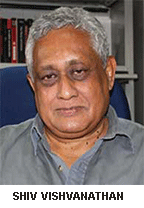 India’s general elections have a touch of the circus. There is a sense of performance, of spectacle but also a comedy of distractions. If one looks for real issues, there’s little about sustainability, knowledge, innovation or justice. Education is not a priority and is hardly seen as part of the core competence of citizenship. Because we have no theory of knowledge, India is being out-thought and bested intellectually in all global forums and league tables.
India’s general elections have a touch of the circus. There is a sense of performance, of spectacle but also a comedy of distractions. If one looks for real issues, there’s little about sustainability, knowledge, innovation or justice. Education is not a priority and is hardly seen as part of the core competence of citizenship. Because we have no theory of knowledge, India is being out-thought and bested intellectually in all global forums and league tables.
Any framework of education should comprise theories of knowledge, pedagogy, and institution building to establish connectivity between knowledge, technology, economy and society. A few words about investment in science or a reference to employment doesn’t add up to education policy. In fact, the ‘missingness’ of education as a concern is the one profound absence of these elections.
There was even a moment of hypocrisy preceding it. President Pranab Mukherjee raised the issue of global rankings pointing out that our top IITs and IIMs rank nowhere in the global league tables of Top 200 universities. There was a furore about rankings, but none of this concern has been expressed during election time.
During the Congress/UPA regime, Union law minister Kapil Sibal appointed an education commission with the distinguished sociologist Andre Beteille as chairperson. But a week later, he dismantled it. After that, serious concern for education disappeared in a philosophical sense. It’s sad that no politician thinks we need a follow-up on the Kothari and Radhakrishnan reports. Education policy does not exist as a narrative in a coherent sense.
It’s not as if BJP has more to offer. Early in his campaign, Narendra Modi while speaking at Delhi’s Shri Ram College of Commerce referred to skilling as education as if no other theory of pedagogy exists. Sadly, there’s no vision of childhood, schools of the future, or an ideal university. There is more concern about the authenticity of Rahul Gandhi’s educational qualifications than about the genuineness of education itself.
But moving beyond the facetious, there was the issue of mandating one year of liberal arts education for all students of Delhi University. A generation of our finest teachers objected to the experiment, observing it was poorly planned and badly conceived. While the BJP and AAP hinted they would restore the status quo ante, no one felt it was an issue for debate. Today’s politicians prefer to discuss security but hardly refer to education as a security issue. There’s a general feeling that once education has been mandalised and vandalised, it’s no longer a terrain of values for the future, a blueprint for a great society.
Consider two very ordinary events. A few months before the elections, before receiving the Bharat Ratna, renowned chemical scientist C.N.R. Rao, called politicians a bunch of idiots. The incident was papered over. No one in Bangalore or in Indian academia seems to experience the deep conflict between science and politics. Today, politicians and scientists are content to dream about the information revolution and think technology is a form of problem-solving which can replace education as a system of thinking and teaching. One wishes to ask IT pioneer Nandan Nilekani, whether he can go beyond information technology and discuss the future of the knowledge revolution. One senses the silence about knowledge creation even among the most technocratic politicians.
Consider a second event, the spate of farmer suicides in Vidarbha, and the drug addiction pandemic sweeping Punjab. With few exceptions, politicians see little connectivity with education while discussing such problems. The AAP candidate and theatre activist, Bhagwant Mann, has raised the issue. At least he senses that education can make a difference, and that culture can be a framework for problem-solving. The tragedy is that political education necessitates acknowledgement that a number of Punjab’s politicians are involved in the drug trade.
Of course it’s a matter of pride that this Indian election is the biggest in world history. This is democracy at its creative best. Yet it’s tragic how the world’s biggest election has little space for education.
Let’s remember that a party like Arvind Kejriwal’s AAP had a flood of journalists debating the political. The question is why there’s no equivalent response from academia. Are we going to wait for the state to summon us? Many questions are as obvious as in an Arnab Goswami interview. Although universities like Amity advertise heavily on news channels, questions about the role and future of private universities are not even discussed. The rise of Jindal, Ashoka, Azim Premji, and Shiv Nadar universities raises hopes of private education for the public good. Yet there is a silence of debate on the issue.
The irony is everyone advocates change. The tragedy is no one sees education upgradation as a precondition of change. It’s silence on real issues that makes this election a surreal experience of much ado about nothing.
(Shiv Vishvanathan is a well-known social scientist and professor/vice dean at O.P. Jindal Global University)